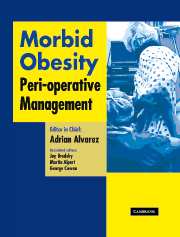Book contents
- Frontmatter
- Contents
- Contributors
- Foreword
- Preface
- Acknowledgments
- Dedication
- Section 1 General aspects
- Section 2 Pathophysiology
- Section 3 Pre-operative management
- Section 4 Peri-operative management of co-morbidities
- Section 5 Pharmacology
- Section 6 Monitoring
- Section 7 Intra-operative management
- Section 8 Post-operative care
- Section 9 Conclusions
- Afterword
- Index
Afterword
Published online by Cambridge University Press: 17 August 2009
- Frontmatter
- Contents
- Contributors
- Foreword
- Preface
- Acknowledgments
- Dedication
- Section 1 General aspects
- Section 2 Pathophysiology
- Section 3 Pre-operative management
- Section 4 Peri-operative management of co-morbidities
- Section 5 Pharmacology
- Section 6 Monitoring
- Section 7 Intra-operative management
- Section 8 Post-operative care
- Section 9 Conclusions
- Afterword
- Index
Summary
In recent years, there has been, literally, a field change in bariatric surgery. In a compound word, it has become “well-developed”. And, this development has manifested itself in the many different ways that this book has sought to convey.
However, further development lies particularly in the sustained productivity of those who support the surgeon and his/her patients, including you, “The Reader”. For example, there is, as of yet, no bariatric surgical cardiologist, pulmonologist, infectious disease or those of other relevant specialties who have taken sufficient interest in bariatric surgery so as to unify as a group to “push the envelope” further in improving the quality of their knowledge and services for the morbidly obese patient. The only exception, apart from the International Federation for the Surgery of Obesity (IFSO) Allied Health Sciences Section, has been the anesthesiologists, who have recently organized under the rubric of the IFSO.
In time, we expect that, with hundreds of thousands of bariatric surgeries performed annually, professional necessity alone will eventually cause each bariatric, surgically relevant specialty to join together just as the anesthesiologists have done.
And, this will arrive none too soon. The current “mysteries” of the excessive appearance of post-operative acute respiratory distress syndrome (ARDS), systemic inflammatory response syndrome (SIRS), multi-system organ failure, infections, depression and other distressing complications following bariatric surgery demand better scientific explanation.
- Type
- Chapter
- Information
- Morbid ObesityPeri-Operative Management, pp. 407 - 408Publisher: Cambridge University PressPrint publication year: 2004



